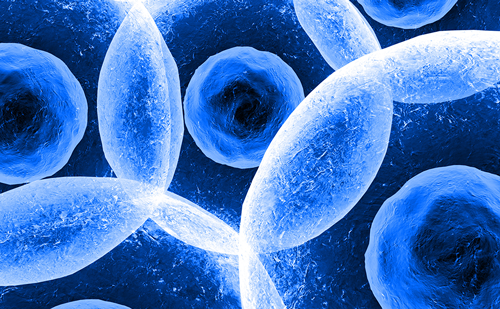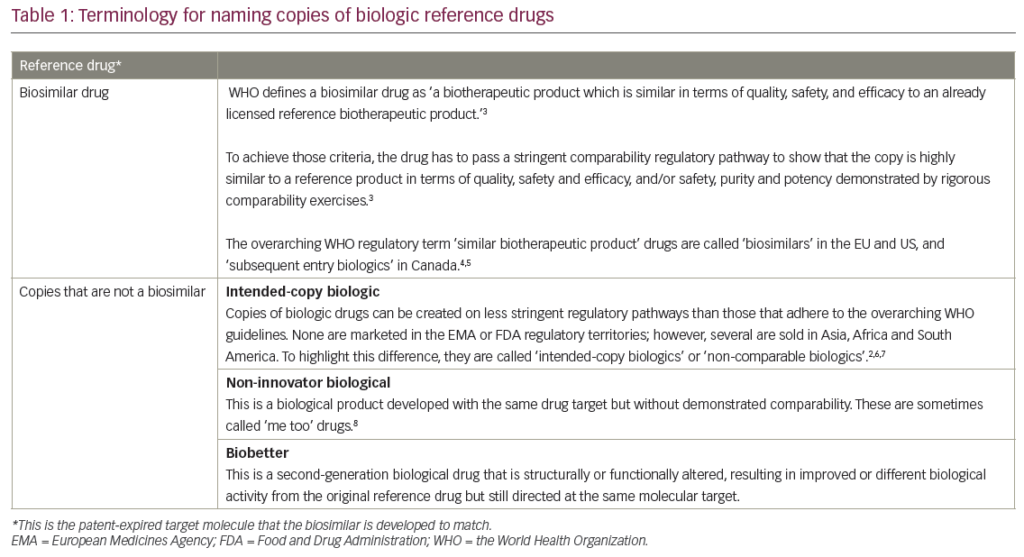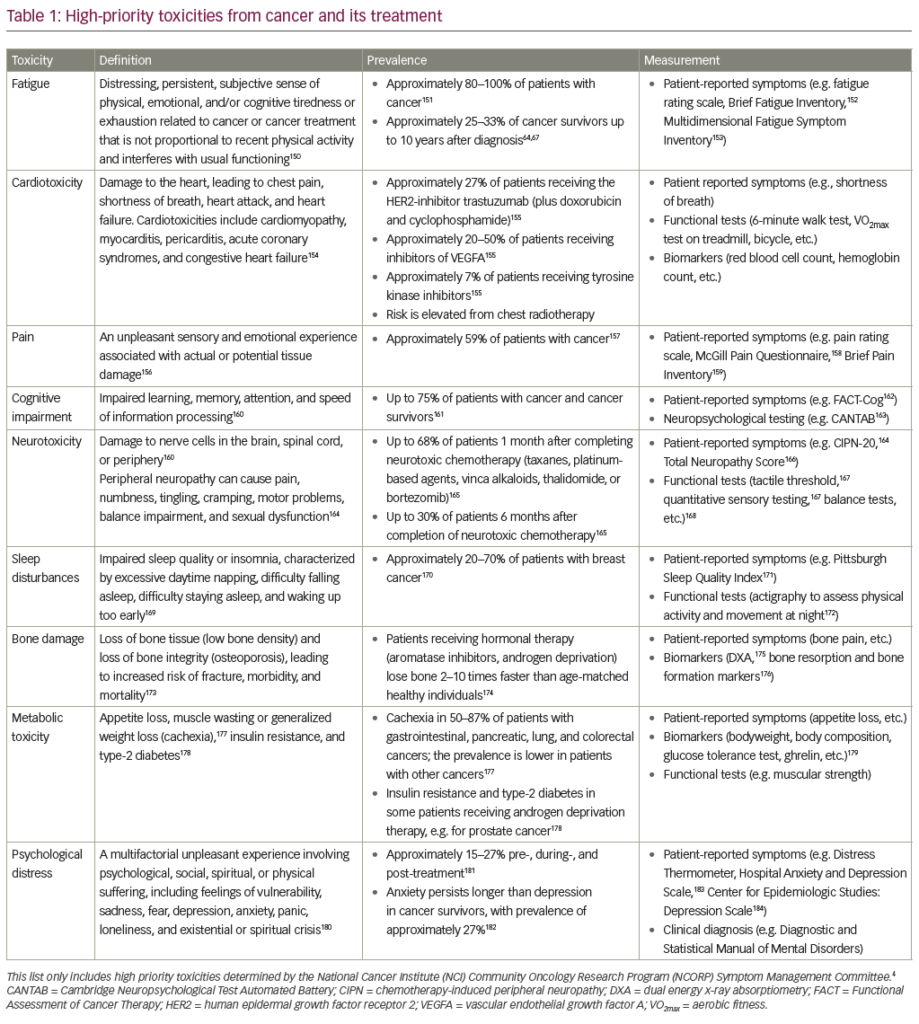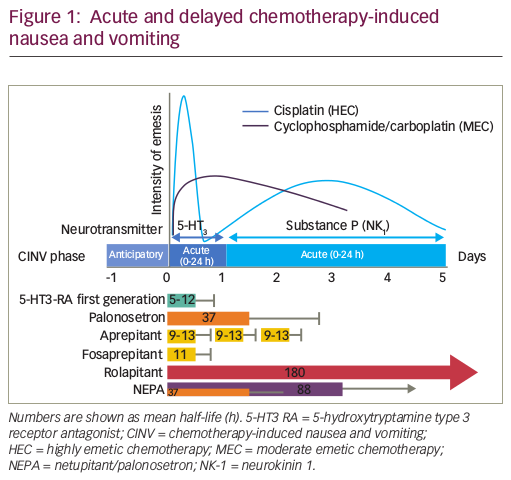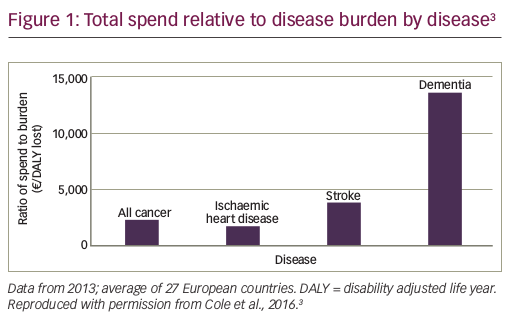Epidemiology of Cancer-related Cognitive Dysfunction
Epidemiology of Cancer-related Cognitive Dysfunction
Cancer and its treatments, including chemotherapy, hormone therapy, and radiation therapy, can deleteriously affect a wide range of mental processes.1–4 Impairments in the main domains of attention, working memory, and other aspects of cognitive function constitute significant cancer-related adverse effects and are reported by 17–75% of patients.2,5–11 Previous studies have reported a higher incidence of cognitive dysfunction among cancer patients than in matched healthy controls.2,7 The degree of cancer-related cognitive dysfunction (CRCD) has been correlated with treatment dose.9 CRCD can be debilitating and enduring.1,10,12
A prospective longitudinal study of the effects of standard-dose adjuvant chemotherapy on cognitive functioning in women with breast cancer showed that 33 and 61% of patients reported cognitive impairment at baseline and after three weeks of chemotherapy, respectively. At one year post-chemotherapy, only 50% of patients who experienced cognitive declines showed improvement, whereas the other 50% simply demonstrated stabilization in cognitive function without improvement.10 CRCD can also negatively affect the psychosocial functioning and quality of life of patients.1,13,14
Pathophysiology and Current Theories
CRCD has been attributed to many factors, including genetic predisposition (e.g. presence of epsilon 4 allele of apolipoprotein E [APOE]), failure of blood–brain barrier integrity, direct/indirect cancer treatment-related (e.g. chemotherapy) brain toxicity, DNA damage, reduction in estrogen and testosterone levels, effects of cytokines in the brain, microvasculature obstruction, and infarction of brain tissue.1,14–19 Other psychologically-based explanations include cancer-related fatigue, anxiety, and depression.3,4,20,21 Efforts to identify and describe CRCD have relied on methods ranging from patient and/ or care-giver self-reports and neuropsychological assessment to serum biomarker analysis (e.g. inflammatory cytokines) and imaging techniques such as structural and functional magnetic resonance imaging (MRI). However, these assessment approaches may be limited in terms of their comprehensiveness and accuracy and may fail to provide a definitive diagnosis of CRCD. Albeit not yet conducted, further studies correlating symptom evaluation with post-mortem examination of cancer-related brain changes that might account for cognitive declines and comparison of post-mortem brain changes in cancer patients with and without CRCD would likely advance our understanding of this condition.
Clinical Presentation of Cancer-related Cognitive Dysfunction
Cognitive impairment among cancer patients and survivors varies in severity. Some patients report mild cognitive problems that necessitate a bit more effort at concentration and memory without a marked effect on activities of daily living and quality of life.22 By contrast, other patients report more severe impairments that interfere with memory and impair daily psychosocial functioning. Many factors, including personal characteristics of patients, tumor biology, treatment regimen, and environmental supports, may affect the severity of CRCD.
Assessment of Cancer-related Cognitive Dysfunction
Reliable screening and assessment of CRCD are the sine qua non for the development of reliable and effective interventions to control this symptom for cancer patients and survivors. However, no ‘gold standard’ measures have been developed and specifically validated for screening and/or assessment of CRCD. No consensus exists in terms of the best methods for assessing this symptom. The trend in the medical literature is to utilize objective neuropsychological measures and compare the performance of cancer patients with a reference or healthy control group in order to determine cognitive dysfunction. Consequently, studies on the effects of cancer and its treatments on cognitive functioning have used a variety of established neuropsychological tests. It has been recommended that basic neuropsychological tests for assessing CRCD should include measures of attention, learning, memory, processing speed, and psychological distress such as depression and anxiety.23 Nevertheless, we should be aware that many objective neuropsychological measures, albeit psychometrically validated for other populations with cognitive dysfunction, are not standardized or validated for cancer patients and survivors.
Patient Self-report Measures and Neuropsychological Measures
Compared with validated standardized neuropsychological measures, patient self-reports of cancer-related cognitive declines are subjective and lack psychometric rigor and external validity. CRCD is a complex phenomenon influenced in an intricate manner by underlying biological, neurological, and psychological systems involved in both unconscious and conscious mental processes. Subjective complaints of cognitive declines could precede clinical findings because cancer patients and survivors may be sensitive to subtle changes in mental processes that are not detectable by available objective neuropsychological measures. If this conjecture is accurate, patient self-reported measures of cognitive declines, albeit subjective, may provide unique information that should be considered and integrated into the treatment process. In order to capture the essence of this cancer-related side effect, a pragmatic approach might utilize a multimodal strategy or a combination of patient self-report and objective screening and assessment tools. Additionally, complete behavioral neurological or neuropsychological testing in oncology research and clinical settings is generally impractical because of time and resource constraints. Comprehensive testing impracticalities underscore the need for brief and reliable methods to help identify precursors or indicators of underlying possible CRCD that warrant further examination. Patient self-report or subjective measures could also help inform development of reliable screening measures for CRCD. Figure 1 describes an assessment paradigm that could facilitate integration of patient self-report and objective measures, and complementary use of screening and comprehensive assessment methods.
Neuroimaging and Biomarkers of Cancer-related Cognitive Dysfunction
Several studies have reported correlations between CRCD and various serum biomarkers (e.g. interleukin [IL] 1, IL-6, tumor necrosis factor [TNF]-alpha), and the value of imaging techniques (e.g. MRI, positron emission tomography [PET], diffusion tensor imaging).24–31 As stated, limited understanding of the pathophysiology of CRCD and insufficient knowledge about reliable ways to assess this symptom underscore the importance and possible benefit of a mixed assessment modality approach (e.g. self-report, objective measures, biomarkers, and imaging). Further studies should examine ways to integrate biomarker analysis and neuroimaging as important tools to aid in the assessment and monitoring of CRCD.
Management of Cancer-related Cognitive Dysfunction
Difficulties in conceptualization and assessment have delayed the development of reliable interventions to control CRCD for patients and survivors. Recent preliminary studies have demonstrated the benefits of both pharmacological and non-pharmacological or behavioral interventions to control CRCD.22,32–37 Finding ways to manage the underlying cause(s) of cancer-related cognitive problems in attention, memory, and other aspects of cognitive function could help reduce the burden of cancer and improve quality of life for patients and survivors. However, difficulties (e.g. poorly understood etiology, lack of consensus on best assessment approaches) inherent in the reliable and valid assessment of CRCD render the development of effective tools for the management of this symptom rather challenging. Other factors that contribute to management challenges involve the subtle nature of changes in mental processes related to cancer (i.e. non-central nervous system tumor) and its treatments, and the subjective aspects of CRCD. A potentially effective method for dealing with these problems is to consider the management of CRCD on a continuum that includes three primary elements: prevention, control, and adjustment (see Figure 2). At the preventive end, clinicians might focus on three main components: awareness, education, and monitoring. Awareness involves recognizing the importance of CRCD and other conditions associated with impaired cognitive function (e.g. older age, lower educational attainment, psychological distress, other medical problems such as diabetes, hypertension, fatigue and sleep problems, and poor general health). Education relates to the effort to inform patients and their families or care-givers about cognitive side effects of cancer and its treatments (e.g. problems in attention, memory, processing speed, executive function, and other aspects). Monitoring involves regularly assessing and encouraging patients and families or care-givers to report and discuss observed difficulties with cognitive function. The control element on the continuum involves the implementation of pharmacological and non-pharmacological or behavioral interventions to alleviate or eliminate the burden of CRCD. Finally, the adjustment element on the continuum involves regular re-examination of symptoms, interventions, and behavioral performance to fully understand the relevance and effectiveness of the intervention and fine-tuning the intervention to achieve an optimal outcome.
Non-pharmacological or Behavioral Interventions
Recent preliminary studies have supported the possible beneficial effect of behavioral interventions to control CRCD.33,38 Behavioral interventions could help cancer patients and survivors find ways to control their problems in attention, memory, and other aspects of cognitive function. This type of intervention includes compensatory approaches that could involve establishing structures in daily routine, using assisted technologies and reminders to aid memory, training in attention and ways to avoid distraction, physical activity, cognitive behavioral therapy, improvement in nutrition and sleep, and participation in mental exercises and brain-plasticity-based cognitive training.39 Ferguson et al. conducted a one-arm cognitive behavior therapy intervention to mitigate reported problems in attention and memory for breast cancer survivors after several years following the completion of chemotherapy.33 This study provided patients with information about chemotherapy-related cognitive problems, taught them how to identify situations that could trigger or exacerbate cognitive problems, and trained them in the use of compensatory strategies such as schedule-making and external cueing to help control these situations. The authors reported that patients demonstrated significant improvements in self-reported cognitive function, quality of life, and performance on standard neuropsychological tests after treatment at two- and six-months’ follow-up. Albeit preliminary, these findings indicate a possible beneficial effect of behavioral interventions to control CRCD for patients and survivors.
Pharmacological Interventions
Two recent preliminary studies from our research group at the University of Rochester Medical Center (URMC) James P Wilmot Cancer Center have demonstrated the potential of pharmacotherapy to control CRCD.40,41 The first study examined the effect of modafinil on cognitive function in breast cancer survivors. This study consisted of a secondary analysis of data from a randomized controlled trial (RCT) on the effect of modafinil on cancer-related fatigue following cancer treatment. Cancer patients included in the RCT scored 2 on the brief fatigue inventory (BFI). During phase 1 of the study, all patients received 200mg of modafinil open-label daily for four weeks. During phase 2 of the study, patients who demonstrated a positive response to modafinil were randomized to receive either an additional four weeks of modafinil or four weeks of placebo. The study recruited 82 women with breast cancer. Of the total recruited, 76 completed phase 1 and 68 completed all assessments in the study. Modafinil improved speed of memory (p=0.01) and quality of episodic memory (p<0.0001) during phase 1. Following randomization at week eight, patients on modafinil demonstrated greater improvement in speed of memory (p=0.03), quality of episodic memory (p=0.02), and mean continuity of attention (p=0.01), indicating a potential benefit of modafinil for the alleviation of attention and memory problems for patients and survivors.41 Another pilot study from our group at the URMC examined the neuroprotective effect of paroxetine hydrochloride (Paxil) on chemotherapy-induced problems in attention and memory.40 The sample included 781 cancer patients (574 females and 207 males) between 22 and 87 years of age. Memory was assessed using a brief patient self-reported memory problem (SRMP) measure consisting of items from the fatigue symptom checklist that relate to memory dysfunction. Psychometric analyses showed that the SRMP was a reliable brief screening that accounted for 72% of the variance in reported memory problems. Our analysis showed a statistically significant effect of Paxil (p<0.05). CRCD is a serious problem for cancer patients and survivors that could be alleviated by Paxil. Further studies are needed to replicate these findings and also to examine the usefulness of other psychotropic agents and combined behavioral and pharmacological interventions to control CRCD.
Combined Behavioral–Psychopharmacological Interventions
Preliminary data suggest potential beneficial effects of both pharmacological and non-pharmacological or behavioral interventions control CRCD for patients and survivors. It is possible that pharmacotherapy could enhance the effects of behavioral interventions or vice versa. Further studies are needed to examine the relationship between pharmacological and non-pharmacological interventions.
Conclusion
The incidence and prevalence of cancer are rapidly rising, making this disease a major worldwide public health problem.42,43 While advances in medical research and cancer therapies have resulted in increased survival, cancer patients and survivors face major challenges associated with treatment-related side effects (e.g. impairments in attention, memory, and other aspects of cognitive function) that affect their psychosocial functioning and quality of life.44 It is important to understand the negative effects of cancer and its treatments on cognitive function in order to develop reliable methods for assessing and managing these symptoms for patients and survivors. Many factors—including discordant findings between objective measures and self-reported chemotherapy-related memory problems of patients and the lack of consensus in terms of best approaches for assessment and treatment of CRCD—have contributed to under-recognition and failure to adequately assess this problem in clinical oncology settings. It is also possible that under-recognition and failure to assess CRCD could be due to the failure of cancer patients to recognize that they have any impairment and to report this problem to their clinicians. Preliminary studies have shown benefits of pharmacological and non-pharmacological or behavioral interventions to control CRCD. Further studies need to identify strategies to encourage patients and providers to report cancer-related cognitive declines, improve assessment, and examine ways to maximize benefits of potentially beneficial treatments. These strategies will lead to a reduction in the burden of cancer and an improvement in psychosocial functioning and quality of life for patients and survivors. ■




